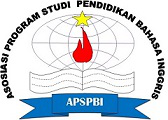Enhancing Students’ Speaking Skills with Wordwall Game-Based Learning: Classroom Action Research
Abstract
The research using the Classroom Action Research (CAR) method aims to help students enhance their speaking abilities through Digital Game-Based Learning (DGBL) using the Wordwall game. This research is motivated by the low speaking skills of students at the elementary level who need innovative methods to increase their participation and speaking ability. This CAR method involves four steps, each consisting of observation, planning, action, and reflection. The findings of this research revealed a considerable improvement in the use of the Wordwall game, including increased active involvement and confidence in speaking. In conclusion, the use of DGBL with Wordwall proved effective in improving the speaking skills of students at the elementary level, as well as creating a more interactive and fun learning environment. This study recommends further use of this method in various educational contexts to improve students’ speaking skills.
Keywords
Full Text:
PDFReferences
Abdullah, M. Y., Supyan, H., & Kamboja, I. (2019). Implementation of flipped classroom model and its effectiveness on English speaking performance. International Journal of Emerging Technologies in Learning, 14(9), 130-147. Doi:10.3991/IJET.V14I09.10348
Adipat, S., Adipat, S., Busayanon, K., Ausawasowan, A., & Adipat, B. (2021, 7 20). Engaging Students in the Learning Process with Game-Based Learning: The Fundamental Concepts. International Journal of Technology in Education, 542-552. Doi:10.46328/ijte.169
Amri, F., & Sukmaningrum, R. (2023, 9 17). Implementation of Wordwall as a Learning Media to Improve Students' Writing Skills. International Journal of Multidisciplinary Approach Research and Science, 495-502. Doi:10.59653/ijmars.v1i03.255
Aulia, E. (2022). Effects of 21st Century Learning on the Development of Critical Thinking, Creativity, Communication, and Collaboration Skills. Journal of Nonformal Education, 8(1), 45-53. Doi:10.15294/jne.v8i1.33334
Az Zahrah, R. A., & Anwar, K. (2023, 6 2). The Effect Using Wordwall Game Applications To Improve Students’ Vocabulary In Chumchon Ban Phanokkhao School. DIDAKTIKA : Jurnal Pemikiran Pendidikan, 29(1), 18. Doi:10.30587/didaktika.v29i1.5246
Chang, C. Y., & Hwang, G. J. (2019). Trends in digital game-based learning in the mobile era: A systematic review of journal publications from 2007 to 2016. International Journal of Mobile Learning and Organisation, 13(1), 68-90. Doi:10.1504/IJMLO.2019.096468
Dehghanzadeh, H., Fardanesh, H., Hatami, J., Javad, E., & Noroozi, O. (2021, 9 3). Using gamification to support learning English as a second language: A systematic review. Computer Assisted Language Learning. Computer Assisted Language Learning, 34(7), 934-957. Doi:10.1080/09588221.2019.1648298
Feiyue, Z. (2022, 4 24). Edutainment Methods in the Learning Process: Quickly, Fun and Satisfying. International Journal of Environment, Engineering and Education, 4(1), 19-26. Doi:10.55151/ijeedu.v4i1.41
Hartt, M., Hosseini, H., & Mostafapour, M. (2020, 10 19). Game On: Exploring the Effectiveness of Game-based Learning. Planning Practice and Research, 35(5), 589-604. Doi:10.1080/02697459.2020.1778859
Hasram, S., Nasir, M. K., Mohamad, M., Daud, M. Y., Rahman, M. J., & Mohammad, W. M. (2021, 9 1). The effects of wordwall online games (Wow) on english language vocabulary learning among year 5 pupils. Theory and Practice in Language Studies, 11(9), 1059-1066. Doi:10.17507/tpls.1109.11
Hung, H. T., & Yeh, H. C. (2023, 12 1). Augmented-reality-enhanced game-based learning in flipped English classrooms: Effects on students' creative thinking and vocabulary acquisition. Journal of Computer Assisted Learning, 1786-1800. Doi:10.1111/jcal.12839
Kemmis, S., & Mctaggart, R. (1988). The Action Research Planner.
Lee, J., Ruxin, L., Fitri s, M., Geok Chan, K., & Mas'ud, F. (2023). Collaborative creativity among undergraduate students as game creators during gamification in a university-wide elective course. Journal of University Teaching and Learning Practice, 20(1). Retrieved from https://ro.uow.edu.au/jutlp
Makrub. (2023). Using word-wall games to improve students' vocabulary mastery: a classroom action research at SD IT Permata Insani Islamic school kota Jambi. Universitas Jambi, Magister Of English Education , Jambi.
Marsevani, M. (n.d.). Tlemc (teaching & learning english in multicultural contexts) a classroom action research: improving speaking skills through work in pairs technique. Retrieved 6 24, 2024, from http://jurnal.unsil.ac.id/index.php/tlemc/index
Meesuk, P., Sramoon, B., & Wongrugsa, A. (2020, 6 1). Classroom Action Research-based Instruction: The Sustainable Teacher Professional Development Strategy. Journal of Teacher Education for Sustainability, 22(1), 98-110. Doi:10.2478/jtes-2020-0008
Pradini, P. C., & Adnyayanti, N. L. (2022, 6 15). Teaching English Vocabulary to Young Learners with Wordwall Application: An Experimental Study. Journal of Educational Study, 2(2), 187-196. Doi:10.36663/joes.v2i2.351
Purwitasari. (2022). The Effectiveness of Wordwall application in Improving Students' vocabulary mastery at mtsn 4 Magetan. STATE INSTITUTE OF ISLAMIC STUDIES PONOROGO, English Education.
Qi, Z., & Zhonggen, Y. (2021). A literature review on the influence of Kahoot! On learning outcomes, interaction, and collaboration. Education and Information Technologies, 26(4), 4507- 4535. Doi:Education and Information Technologies
Rao, P. S. (2019). The improtance of speaking skills in English classrooms. Alford Council of International English & Literature Journal, 2(2). Retrieved 6 24, 2024, from www.acielj.com
Sharma, R. C. (2022, 6). The importance of speaking skills of youth in english classrooms: a comparative analysis of. Educational Technology and Management Academy, 2(2). Retrieved 6 24, 2024, from https://educationatetma.etma-india.in/index.php/journal/index
Syawaluddin, A., Afriani Rachman, S., & Khaerunnisa. (2020, 8 1). Developing Snake Ladder Game Learning Media to Increase Students’ Interest and Learning Outcomes on Social Studies in Elementary School. Simulation and Gaming, 432-442. Doi:10.1177/1046878120921902
Umairoh, N. A., & Agustina, R. K. (2023). The Effectiveness of Wordwall Game in Teaching Speaking for Class Eighth. Jurnal Ilmiah Wahana Pendidikan(15), 738-744. Doi:10.5281/zenodo.8264675
Wandari, T., Unsiah, F., & Sahar, R. (2024). Utilizing wordwall.net on the improvement of students' vocabulary mastery: an ict-based lesson. JOLLT Journal of Languages and Language Teaching, 12(2), 952-962. Doi:10.33394/jollt.v%vi%i.10754
Xu, Z., Eutsler, L., Chen, Z., Geng, Z., & Kogut, A. (2020). A scoping review of digital game-based technology on English language learning. Educational Technology Research and Development, 68(3), 877-904. Doi:10.1007/s11423-019-09702-2
Yanti, Y., Raharjo, T. J., & Sumarni, W. (2022). The Improvement of Students' Learning Outcomes and Report Writing Skills at The Sixth Grade Elementary School Use the Learning Model Think-Talk-Write and Wordwall Media. Retrieved 6 24, 2024, from https://journal.unnes.ac.id/sju/index.php/jpe
Yudha, H. T., & Mandasari, B. (2021). The Analysis of Game Usage for Senior High School Students to Improve Their Vocabulary Mastery. Retrieved 6 24, 2024, from http://jim.teknokrat.ac.id/index.php/english-language-teaching/index
Yusra, K., & Lestari, Y. B. (2020, 4). Digital based learning in EFL: its effect on young learners' self- regulated learning. The Asian ESP journal, 16(2.1). Retrieved from https://www.researchgate.net/publication/342065474
DOI: http://dx.doi.org/10.20527/jetall.v7i2.19682
Article Metrics
Abstract view : 332 timesPDF - 222 times
Refbacks
- There are currently no refbacks.
This journal is indexed in:


This Journal is listed in:
 Journal of English Teaching, Applied Linguistics and Literatures (JETALL)
Journal of English Teaching, Applied Linguistics and Literatures (JETALL)








.png)



1.png)
